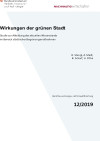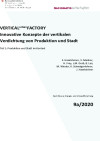Suchergebnisse
Cooling Cities

Innovative Lösungen für lebenswerte Ballungsräume
energy innovation austria
2/2019
Herausgeber: BMVIT und Klima- und Energiefonds
Deutsch, 12 Seiten
Downloads zur Publikation
ÖGUT-Umweltpreis 2019: Kategorie "Stadt der Zukunft"
Mit Unterstützung des BMVIT prämiert die ÖGUT in der Kategorie „Stadt der Zukunft“ F&E- sowie Demoprojekte, die das Potenzial von Gebäuden als netzdienliche und flexible Energiespeicher ausloten. Einreichschluss ist der 30. September 2019.
Online-Konsultationen von Bundeskanzleramt und BMNT
Das Bundeskanzleramt bittet um Inputs von Stakeholdern sowie interessierten BürgerInnen bei der Erstellung einer österreichischen FTI-Strategie. Die Antworten werden bei der weiteren Erarbeitung der Strategie einfließen. Die Online-Befragung endet am 31. Oktober 2019.
ÖGUT-Umweltpreis 2019 - Kategorie „Stadt der Zukunft“
Die Gemeinnützige Wohnungsgesellschaft Arthur Krupp, der IIBW und PartnerInnen sind Sieger der Kategorie! Sie wurden für den sozialen Wohnbau "Viertel Hoch Zwei" mit Bauteilaktivierung ausgezeichnet. Das Team freut sich über das von BMVIT und FFG zur Verfügung gestellte Preisgeld von 5.000 Euro.
Errichtung der Grünfassaden des Projekts „50 grüne Häuser“
Mitte November 2019 wurden die ersten 50 Stück des neu entwickelten Grünfassaden-Moduls „BeRTA“ in Innerfavoriten an den Fassaden von zehn Häusern entlang eines Straßenzugs installiert. Gewählt wurde der Standort in Favoriten aufgrund der besonders hohen Anzahl an urbanen Hitzeinseln.
Smart Cities Demo - Living Urban Innovation 2018
In einer Smart City oder einer Smart Urban Region werden technische und soziale Innovationen intelligent eingesetzt und kombiniert, um die Lebensqualität künftiger Generationen zu erhalten bzw. zu optimieren. Die Ausschreibung ist bis 22. Oktober 2018 geöffnet und mit einem Budget von 4,9 Mio. Euro dotiert.
Wirkungen der grünen Stadt
Studie zur Abbildung des aktuellen Wissenstands im Bereich städtischer Begrünungsmaßnahmen
Eröffnung von Österreichs erstem Cradle-to-Cradle inspiriertem Plusenergiegebäude
Am 8. September 2017 wurde mit einem großen Fest die neu errichtete Druckhalle von gugler* in Pielach bei Melk eröffnet, die umfassenden Standards der Nachhaltigkeit gerecht wird.
Grüne und resiliente Stadt - Steuerungs- und Planungsinstrumente für eine klimasensible Stadtentwicklung
Ziel des Projekts war ein „Proof of Concept“ eines Regelkreises und Tool-Sets zur Steuerung, Optimierung und Evaluierung einer grünen und klimasensiblen Stadt(teil)planung bestehend aus städtebaulichen und freiraumplanerischen Instrumenten sowie Klimasimulationen auf unterschiedlichen Maßstabsebene.
Spatenstich "KooWo Volkersdorf" - ein "Stadt der Zukunft" Demonstrationsprojekt
Am 23. März 2018 wurde der Grundstein für das gemeinschaftlich geplante Wohnprojekt "KooWo Volkersdorf" bei Graz gelegt. Das Demonstrationsprojekt aus dem BMVIT Forschungs- und Technologieprogramm "Stadt der Zukunft" wendet die Zielvorgaben des energiepolitischen Modells der 2000-Watt-Gesellschaft im ländlichen Raum an und soll dabei zeigen, dass große Ressourcen- und Energieeinsparungen möglich sind.
Fassadenbegrünung in Favoriten gestartet!
Am 10. September wurde gefeiert: die GewinnerInnen der 50 Grünfassaden-Module wurden in die Bezirksvorstehung Favoriten eingeladen um „ihre Grünfassade“ entgegenzunehmen.
act4.energy veranstaltet 2. Forum in Eisenstadt
Großen Anklang fand das 2. Forum des Stadt der Zukunft Innovationslabors act4.energy, das am 27.11.2018 in Eisenstadt stattfand. Vor Ort diskutierte Michael Paula (BMVIT) gemeinsam mit Landesvertretern und Wirtschaftspartnern die Umsetzung regionaler Energiesysteme.
act4.energy veranstaltet 2. Forum in Eisenstadt
27. November 2018
Eisenstadt
Großen Anklang fand das 2. Forum des Stadt der Zukunft Innovationslabors act4.energy, das am 27.11.2018 in Eisenstadt stattfand. Vor Ort diskutierte Michael Paula (BMVIT) gemeinsam mit Landesvertretern und Wirtschaftspartnern die Umsetzung regionaler Energiesysteme.
e-nova 2017: Zukunft der Gebäude. digital - dezentral - ökologisch
23. - 24. November 2017
Pinkafeld
Gebäude und Areale im Fokus, betrachtet die e-nova nachhaltige Technologien aus einem energie- und umweltbezogenem Blickwinkel mit jährlich angepasster Schwerpunktsetzung. Als internationale wissenschaftliche Konferenz konzipiert, richtet sich die e-nova sowohl an die wissenschaftliche Gemeinschaft als auch an berufsfeldorientierte Fachleute.
Vorzeigeregion Energie - 2. Ausschreibung
Das Programm baut auf Ergebnissen des Strategieprozesses „Smart Grids 2.0“ und den Erfahrungen bisheriger in Österreich durchgeführter F&E und Demovorhaben auf nationaler bzw. europäischer Ebene auf. Zielgruppe sind Akteure, die sich mit Forschungs-, Entwicklungs- und Innovationsfragen in Zusammenhang mit der Energiewende befassen. Einreichschluss: 31. Juli 2017
Wirkungen der grünen Stadt

Studie zur Abbildung des aktuellen Wissenstands im Bereich städtischer Begrünungsmaßnahmen
Schriftenreihe
12/2019
R. Stangl, A. Medl, B. Scharf, U. Pitha
Herausgeber: BMVIT
Deutsch, 63 Seiten
Downloads zur Publikation
VERTICALurbanFACTORY: Innovative Konzepte der vertikalen Verdichtung von Produktion und Stadt

Das Projekt beforscht Möglichkeiten und Potenziale hocheffizienter Raumnutzung durch moderne Konzepte „gestapelter“ Funktionen und vertikaler Produktion.
Schriftenreihe
9/2020
E. Haselsteiner, V. Madner, H. Frey, L.M. Grob, B. Laa, M. Winder, K. Schwaigerlehner, J. Haselsteiner
Herausgeber: BMK
Deutsch, 253, 153 bzw. 52 Seiten
Downloads zur Publikation
Stadt der Zukunft Vernetzungstreffen
13. Oktober 2022
CampusVäre, Dornbirn
Ziel des Treffens war es, Projektnehmer:innen der 9. Ausschreibung des Förderprogrammes „Stadt der Zukunft“ einen Überblick über laufende und geplante Aktivitäten im Programm „Stadt der Zukunft“ zu geben, startende Projekte kennenzulernen, sich mit diesen abzustimmen und zu vernetzen sowie bisherige Erfahrungen und Ergebnisse auszutauschen.
Webinar: Innovationen in der Kreislaufwirtschaft
15. Dezember 2022, 11:00 - 12:00 Uhr
Online
Webinar von AEE Intec zur aktuellen Ausgabe der Zeitschrift „nachhaltige technologien“ mit dem Schwerpunktthema „Innovationen in der Kreislaufwirtschaft".
Workshop: Low Tech - High Effect!
25. Februar 2016
IG Architektur, Gumpendorfer Straße 63 B1060 Wien, AT
Im Rahmen dieses ExpertInnenworkshops werden nachhaltige Bauweisen unter den Aspekt der Anwendung von Low Tech Lösungen diskutiert.
